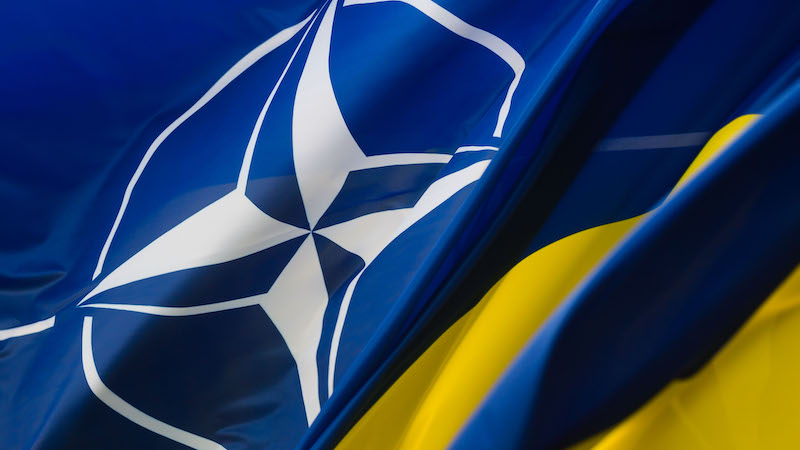
Ukraine’s Geopolitical Importance Is Getting Lost
By Adm. James Stavridis, dean emeritus of the Fletcher School of Law and Diplomacy at Tufts University
It is easy to get lost in the domestic side of the firestorm over President Donald Trump’s ill-advised phone call with Ukrainian President Volodymyr Zelenskiy in July. The House’s impeachment inquiry will lead every news broadcast for the foreseeable future. What is missing in much of the conversation, however, is consideration of the geopolitical importance of Ukraine, and how the scandal will affect the uncertain future of that nation and its region.
When I became supreme allied commander at NATO in the spring of 2009, Europe was reeling from Russia’s short, brutal and highly effective invasion of Georgia. It will go down in military history as the first time a traditional kinetic strike (bombs, rockets, tanks, fighters, troops, etc.) was combined with a very determined offensive cybercampaign. There was also a strong propaganda and strategic misinformation effort; Russian special forces in unmarked uniforms; and insurgent-like attacks against critical infrastructure. This emerging “hybrid warfare” against Georgia was the wave of the future – and eventually it came crashing down on Ukraine.
Following its independence from Russia in 1991, Ukraine had unsettled politics but was generally trending toward the West. It sought a process toward membership in the European Union and became an enthusiastic, if unskilled, partner to NATO. During my time commanding the alliance, Ukrainians participated in many exercises – even hosting some; deployed troops to Afghanistan; participated in the Balkans peacekeeping missions; and supported counterpiracy operations off the coast of East Africa. I visited several times and was generally impressed with their military, while recognizing governmental corruption was a problem.
By 2013, the population’s dissatisfaction with the Kremlin-supported government of Viktor Yanukovych crested, and he was ousted the so-called Maidan revolution. Subsequently, Russia invaded, using the hybrid warfare techniques it honed on Georgia. Putin seized Crimea and supported the breakaway rebels in the Donbas region of southeastern Ukraine. Since Ukraine was only a NATO partner, not a member, the invasion did not trigger an Article V response, in which the alliance is required to undertake a military defense. But NATO and the U.S. nonetheless began to supply military and economic aid to Ukraine, first non-lethal equipment under President Barack Obama then lethal weaponry under Donald Trump. It is that aid, primarily Javelin antitank missiles, that Trump is accused of withholding to put pressure on the Ukrainians to investigate former Vice President Joe Biden and his son Hunter.
This tortured sequence of events matters because Ukraine itself matters. First, Ukraine is a big, proud nation with a long history of independence. It is the largest country by size located entirely in Europe, and has a population of 42 million. Despite being an on-again, off-again part of the Russian/Soviet Empire, it always had its own language, culture and outlook.
Today, it is one of the world’s leading exporters of food and iron. Its geographic position on the hydrocarbon-rich Black Sea – bordered by four NATO nations and of course Russia – is important as well. All this, taken along with its industrial capability (admittedly much diminished by the war in the southeast), makes Ukraine the state with the greatest potential in a generally depressed part of Europe.
Second, Ukraine falls between East and West. “Ukraine seeks neither to be pro-West or pro-Russia; we want to be pro-Ukraine,” the Ukrainian defense chief at the time, Colonel General Hryhoriy Pedchenko, often told me. America’s goal ought to be exactly that: to give Ukrainians the geopolitical space to make their own decisions about how to align.
Putin, of course, sees it differently. In the Russian version of events, Ukraine has historically been a key element of the “near abroad,” the ring of vassal states that provided strategic space to Russia and took part in its centrally dominated trade system. After the unrest of the Orange Revolution of 2004 and the Maidan in 2014, he was determined to undermine Ukraine’s democracy, and has ruthlessly done so. For the West, allowing Ukraine to be forced fully back into the Russian orbit is a dangerous precedent – the former Warsaw Pact states in the Balkans, Baltics and Eastern Europe are watching with trepidation.
Finally, allowing Russian aggression to stand seriously undermines global diplomatic and international legal norms. The invasion and annexation of Crimea was the first time since World War II that territory had been seized in Europe. It has been widely condemned, and Russia is under significant sanctions as a result, including ejection from the former G-8. If the West abandons Ukraine now, the message to the international community is that big nations can simply “take a bite” out of smaller neighbors.
It would be a significant geopolitical mistake for the West to abandon Ukraine out of frustration with the emerging Trump impeachment process or exhaustion over dealing with Putin. We should continue to provide military and economic assistance, to include offensive weapons systems and training; to encourage the European Union to work toward membership for Ukraine; and to enhance a strong Ukraine-NATO partnership, both in exercises and operations. While NATO membership is not in the foreseeable future, such exercises and engagement make sense for both sides.
For all these reasons, events in Ukraine will stretch far beyond the borders of Europe. Trump’s decision to withhold military aid, for whatever reason, was a significant misstep, because it undermined confidence in the U.S. and Western guarantees to all its allies, partners and friends. Trump’s phone call with Zelenskiy wasn’t just bad domestic politics, but terrible geopolitics as well.
This piece was republished from Bloomberg Opinion.
